Keywords
|
Forests
Seeds Oceans Coral Reefs |
Wilderness Areas
Regreening Replenishing Fisheries Offsetting Erosion and Desertification |
Effects of Climate Change
Endangered Species Saving Wildlife Biodiversity |
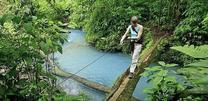
How Costa Rica’s eco-economy saved its forests
From knowledge.allianz.com - November 29, 2014 Allianz Knowledge on Environment: Ahead of the Rio+20 UN conference on sustainable development Allianz Knowledge talks to Dr. Ina Porras of the International Institute for Environment and Development (IIED) about how Costa Rica's environmental protection policies protect forests and biodiversity and tackle climate change through payments for ecosystem services. http://knowledge.allianz.com/?1932/how-costa-ricas-eco-economy-saved-its-forests 
Protecting rainforest through agriculture, forestry
From www.sciencedaily.com -November 28, 2014 Conservationists are always looking for ways to halt the pace of deforestation in tropical rainforests. One approach involves recultivating abandoned agricultural land. Working in the mountainous regions of Ecuador, the an international team of researchers found afforestation and intense pasturing to be particularly effective, clearly increasing the environmental and economic value of abandoned farmlands. Via Wildforests 
Industrial engineer quits job to plant mini-forests everywhere
From www.treehugger.com - October 29, 2014 Using efficiency techniques learned at Toyota, Shubhendu Sharma believes he can grow native forests faster than nature ever could. 
Bamboo Could Be a Savior for Climate Change, Biodiversity
From www.ipsnews.net - October 29, 2014 "The evidence shows that [bamboo] is being seriously undervalued as a possibility for countries to engage in biodiversity protection and protection of the natural environment. The plant bamboo, and there are about 1,250 different species, has a very important role to play in environmental protection and climate change mitigation. Bamboos have very strong and very extensive root systems and are therefore amazing tools to combat soil erosion and to help with land degradation restoration." -- Dr. Hans Friederich 
Biodiversity, Climate Change Solutions Inextricably Linked
From www.ipsnews.net - October 29, 2014 "Our biodiversity is important for our health, our status, our attractiveness as a country and it is important that we conserve it and use it in a sustainable manner that it is there for generations to come." Rewilding the World
October 17, 2014 On October 8th 2014 acclaimed writer, George Monbiot and the inspiring conservationist Alan Featherstone, Executive Director of Trees for Life presented their ideas on the concept of 'rewilding' to a sold out lecture room at the University of Edinburgh. In itself it was encouraging to see that their were so many people interested in what these men had to share, that there weren't even enough seats available. Monbiot and Featherstone, who come from very different backgrounds, set out to to describe their perspectives on the social, ecological and developmental benefits of rewilding, including the return of 'keystone species' to degraded habitats across the globe. They also explained how their own experience and connection to the natural world had inspired them to pursue their mission to connect people to nature and to their cause to improve the quality of the natural world left around us. If you follow this link you will be able to watch Monbiot's and Featherstone's lecture: http://www.sustainability.ed.ac.uk/events/series/visions/rewilding |
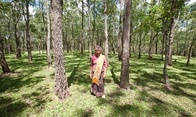
Women on frontline of climate change make big impact on small grants
From www.theguardian.com - November 29, 2014 From Guatemala to Indonesia, bold action by women in communities threatened by extreme weather shows there is an alternative to costly international schemes. 
Rwanda Restores Ecosystems, Generating Record Tourism and New Opportunities for Growth - UNEP
From unep.org - November 18, 2014 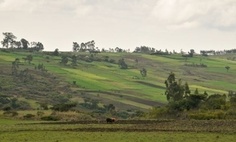
Regreening program to restore one-sixth of Ethiopia's land
From www.theguardian.com -November 1, 2014 Fifteen years years ago the villages around Abrha Weatsbha in northern Ethiopiawere on the point of being abandoned. The hillsides were barren, the communities, plagued by floods and droughts, needed constant food aid, and the soil was being washed away. Today, Abrha Weatsbha in the Tigray region is unrecognisable and an environmental catastrophe has been averted following the planting of many millions of tree and bush seedlings. Wells that were dry have been recharged, the soil is in better shape, fruit trees grow in the valleys and the hillsides are green again. The “regreening” of the area, achieved in just a few years for little cost by farming communities working together to close off large areas to animals, save water and replant trees, is now to be replicated across one sixth of Ethiopia – an area the size of England and Wales. The most ambitious attempt yet to reduce soil erosion, increase food security and adapt to climate change is expected to vastly increase the amount of food grown in one of the most drought- and famine-prone areas of the world. 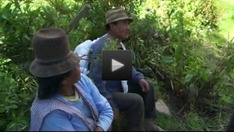
Bolivia enshrines natural world's rights with equal status for Mother Earth
From www.theguardian.com - October 29, 2014 Bolivia is set to pass the world's first laws granting all nature equal rights to humans. The Law of Mother Earth, now agreed by politicians and grassroots social groups, redefines the country's rich mineral deposits as "blessings" and is expected to lead to radical new conservation and social measures to reduce pollution and control industry. The country, which has been pilloried by the US and Britain in the UN climate talks for demanding steep carbon emission cuts, will establish 11 new rights for nature. They include: the right to life and to exist; the right to continue vital cycles and processes free from human alteration; the right to pure water and clean air; the right to balance; the right not to be polluted; and the right to not have cellular structure modified or genetically altered. 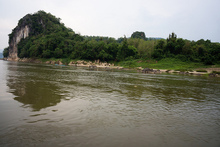
Community Forests Formally Recognized in Cambodia
From www.cepf.net - December 15, 2014 Close to 6,000 hectares of community forests were recently recognized by the Kratie Forestry Administration in northeast Cambodia, extending conservation management to natural habitats along the Mekong River in one of Asia’s last intact lowland ecosystems. The agreements designating the two community forests, one in O’Krieng village and the other in O’Kok village, were signed in December 2013, with approximately 200 stakeholders attending the signing ceremony. Africa Foundation - Home Page
From africafoundation.org - June 12, 2013 The projects that Africa Foundation fund and facilitate, assist in the protection of Africa's wilderness through support for the socio-economic development of rural populations living in, or close to the conservation areas. |